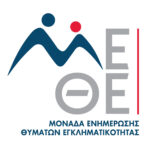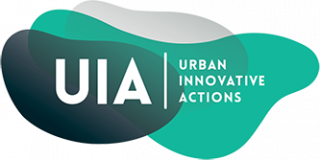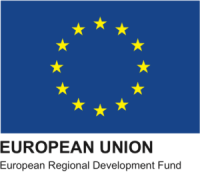Governance, renovations, cooperation, support, communication… These are some of the concepts that have been constantly present throughout the activities of the second year of implementation of the Be Secure Feel Secure project.
This Journal focuses on the evolution of the project from March 2021 to December 2021.
Executive summary
This is the second journal of the Be Secure Feel Secure (BSFS) project. You can read the previous Journal (no. 1) here.
The project, led by the Municipality of Piraeus, started its implementation in 2020, and is part of the Call no. 4 of the Urban Innovative Actions initiative to tackle urban security in European cities through experimental approaches.
BSFS seeks to create new means to reduce crime and improve citizens’ perception of security in the city of Piraeus through governance structures with multiple stakeholders, technological tools, and social and spatial actions. For this, the project focuses on the 2nd and 5th municipal departments within Piraeus as its areas of implementation. These departments are characterized by commercial activity and a high population density, but also by low social cohesion, sense of degradation of the built environment, fear of crime, and weak collaboration among the critical information systems of the urban authority, the police and other key stakeholders.
Last year, one of the milestones of the project was accomplished: the creation of the Local Council for Crime Prevention (LCCP). This Council is integrated by municipality representatives, police officers, and scientific experts, where they participate, communicate, and decide on strategies to tackle crime. Another milestone was the survey conducted by Panteion University to understand perceptions of insecurity and fear of crime addressed at households and commerce owners in the aforementioned districts. Lastly, the first steps to create the CURIM platform – a digital tool to assess cyberthreats, and to manage and analyze data of criminal incidence involving citizen communication and official sources – were implemented.
This year, the project has continued the work on the CURIM platform. The communication of the project’s approach and results, and the interaction with citizens have been two important areas of action. One of the most important milestones of this second year was the successful establishment of the Victim Support Unit in May 2021. However, the project has been affected by the COVID-19 crisis, which we will discuss further on.
In the sections that follow, we will explore the 7 UIA Challenges: Leadership, Public Procurement, Organizational Arrangements, Participative Approach, Monitoring & Evaluation, Communication with Beneficiaries, and Upscaling.
Partnership:
- Municipality of Piraeus
- Singular Logic SA (SLG)
- Panteion University of Social and Political Sciences – Department of Social Science – Criminology Lab
- University of Piraeus Research Center (UPRC) – Department of informatics
- European Forum for Urban Security (EFUS)
- SPACE Hellas (SPACE)
- Ministry of Citizen Protection – Police (MCP)
Challenge 1: Leadership
Effectiveness of the work structure, keeping leaders involved, chain of levels, impact of changes of leadership.
This project’s partnership is led by the Municipality of Piraeus. The project has hardly diverted from the initially foreseen structure of leadership and the team affirms that the structures put in place have been working well. At this phase, the responsibilities, and levels of involvement are well integrated into the everyday functioning of the structure. The COVID-19 pandemic made remote working and video-calls an indispensable part of communication. However, as contagions decreased, in-person work was possible. The COVID-19 not only affected communications but had significant impact on the delivery and fulfillment of certain actions on the expected dates. This has resulted in a major change: an extension of the project duration by 7 months, the leadership structure will remain the same.
Challenge 2: Public procurement
Engaging service providers, issues of hyper-specification, data on procurement processes, ensuring local benefits in commissioning and procurement processes (inclusion, employment, environment).
Being led by a municipal/local government agency, the project has to adhere to specific procedures, internal organization, and national law regarding finances.
Several acquisitions and hiring took place during this period, starting with the acquisition of motorcycles and 4 police patrol cars. Due to the COVID-19 pandemic, the delivery of the cars has been delayed, and it is expected to be on February 2022.
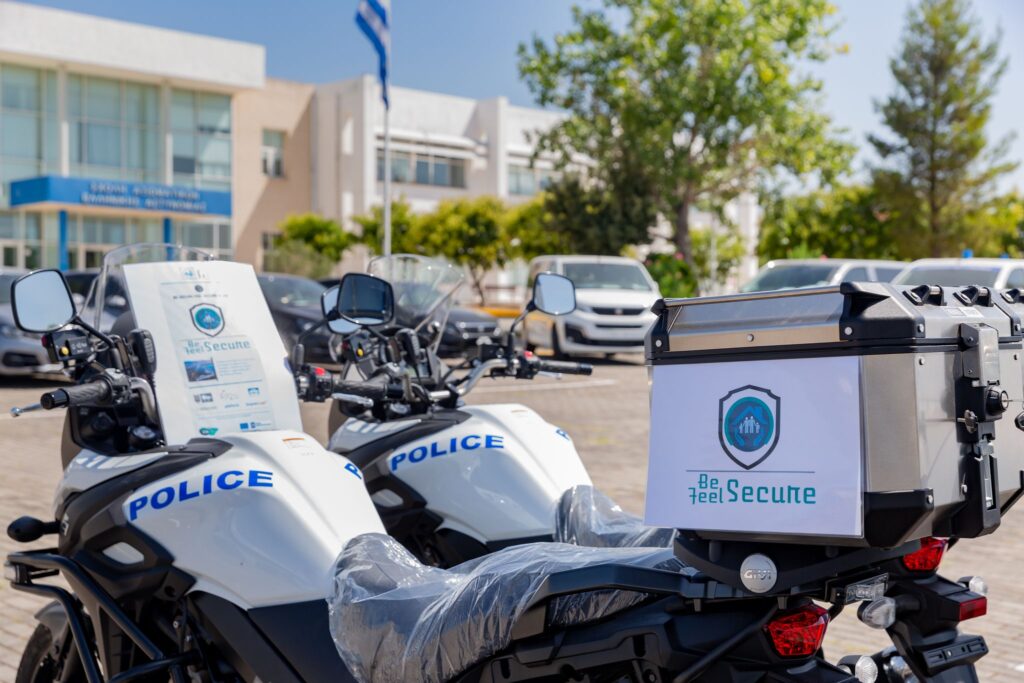
The work that started the previous year to establish the Victim Support Unit in working order continued, and the unit opened in May 2021. With this came the need to open and hire specialists to cover 4 positions (from a pool of 45 applicants): 2 social workers, 1 psychologist, and 1 legal advisor. The Victim Support Unit gives crime victims appropriate assistance to ease their recovery and help them with sufficient access to justice, giving them information, advice or directing them to the adequate services or experts. The on-site personnel are responsible for carrying out individual evaluations and psychological counseling of the victim, refer and orient the victim to pertinent bodies, and provide legal advice and bureaucratic guidance.
One of the more challenging axes of action in this period has been the beautification and improvement of deteriorated buildings. As mentioned in the previous Journal, the improvement of the built environment is considered part of the actions to improve perception of insecurity and prevent crime. For this, the project contemplated physically improving certain buildings, and on other cases, locking down abandoned structures, as well as renovation of 8 playgrounds. On the latter, a contractor has been assigned to perform works on all of the playgrounds. The MUA foresees that the procurement processes are likely to finish by the end of February 2022, and the works are likely to be completed by May 2022. However, the project has faced several challenges on the improvements of buildings, starting with the fact that the abandoned buildings are owned by individuals. Owners of neighboring buildings might perceive publicly-funded improvements of buildings as an unequal treatment. Thus, for the BSFS to proceed, they would have to request the owners to pay for these improvements. To overcome this challenge, the MUA has decided to modify their targets and propose that the beautification and lockdown actions be carried out on public schools, which are owned by the municipality. However, the interventions have been delayed significantly.
Challenge 3: Organizational arrangements
Cross-department working, effective coordination mechanisms, sharing risks and rewards across departments, role of senior management in integrating groups.
Continuing with the previous notes on the spatial interventions and the challenges of changing targets, the collaboration and communication with other municipal agencies has been paramount, as the BSFS project cannot perform actions without their approval or input. The Municipality of Piraeus has met with the Deputy Mayor of Structuring, City Planning, and Architecture and the Authorized Municipal Councilor of Road Construction to discuss the matters related to the studies required and the works that will be carried out. Likewise, visits have been conducted to the playgrounds and other locations that are going to be intervened. The need to involve several departments that do not appear in the original scope of the project but proved necessary, has also entailed delays. Effective coordination was crucial for the development of the CURIM platform and mobile app. The alpha version is almost finished. The acquisition of mechanisms that retrieve information from the police system, the anti-theft sensors, the web mining and open intelligence modules have been implemented. Risk visualization and reporting features for the crime risk assessment component is at its final stages of development. The process of the CURIM development has perhaps been the most streamlined, due to the fact that there are few cross-organizational requirements for its creation, besides the requests for information. Nevertheless, it has had various delays and obstacles due to the COVID-19 pandemic.
Challenge 4: Participative approach
Involving organizations and individuals, keep partners and stakeholders involved, solving conflicts, limits of shared responsibilities.
Various interesting developments involving participation of individuals and organizations have taken place during this period.
The BSFS has carried out Students’ Awareness Sessions: 4 seminars for an audience of 680 high school students, where topics of bullying and internet security were discussed. These Sessions were designed by the Laboratory of Urban Criminology of Panteion University and took place in May and June 2021. Prior to this event, the BSFS project partners and representatives met virtually with Parents & Guardians Associations of Piraeus. This allowed them to discuss not only the Students’ Awareness Sessions (which motivated a vivid exchange on crime prevention in early stages), but also to present the BSFS project and its actions for community empowerment and dialogue. On a related note, sessions of information with shop owners have been postponed due to COVID-19 and the holiday season at the end of the year.
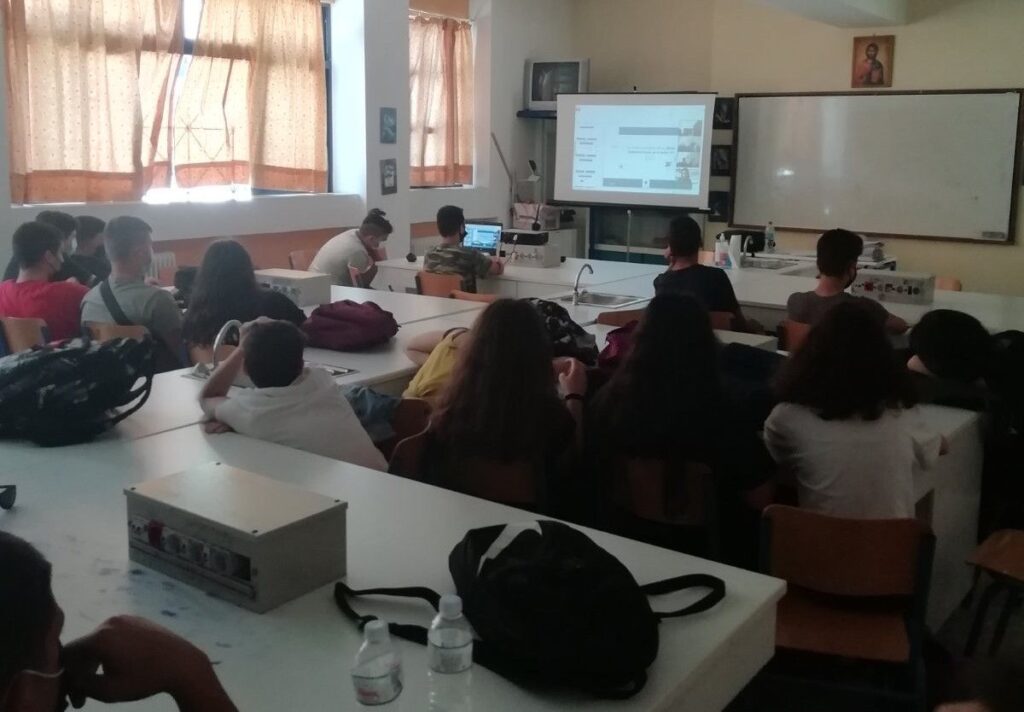
With the goal of preventing victimization and create awareness on these topics, BSFS called upon experts from the “Smile of the Child” initiative and the Cyber Crime Division of the Hellenic Police, who gave presentations and answer questions from the students. The EFUS provided BSFS with sets of good practices to apply to the design of awareness actions on bullying and cyberthreats. While seminars on subjects of security may appear as a clear-cut action, it indeed required the participation of various organizations (local and international) as well as the participation of the young audience members.
Another interesting initiative that took place during this period was the Minecraft competition. Originally, this outreach activity was meant to be a sports event outdoors with youths of Piraeus, but the risk of contagion of the COVID-19 virus and the restrictions put into place motivated the switch to a virtual event. The Municipality of Piraeus in collaboration with Space Hellas and Singular Logic created a digital copy of Piraeus in the environment of the Minecraft game. Participants could register to play Cops and Robbers online. The event took place on December 5, 2021. More information can be found here. The reactions were positive and the event had important participation from the young inhabitants of Piraeus.
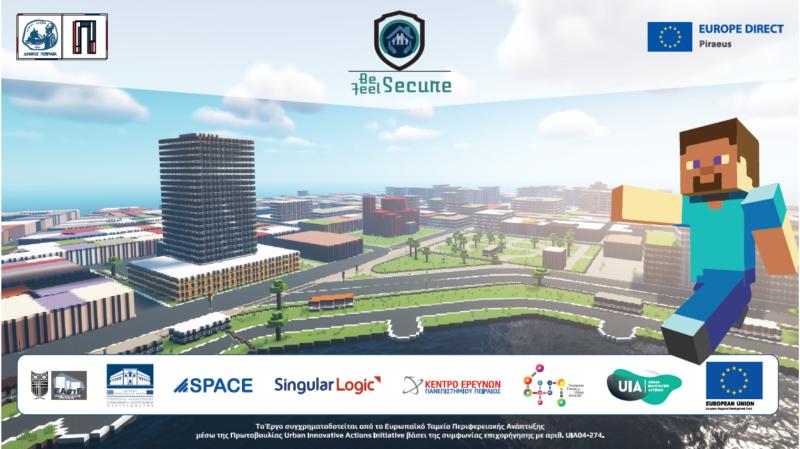
As for the milestone of this period -the establishment of the Victim Support Unit (METHE for its Greek name)- collaborators from Panteion University undertook the training of the newly hired personnel of the unit. The METHE is based on the design led by the Laboratory of Urban Criminology of Panteion University. However, input from the Data Protection Officer suggested the need of modifying various aspects.
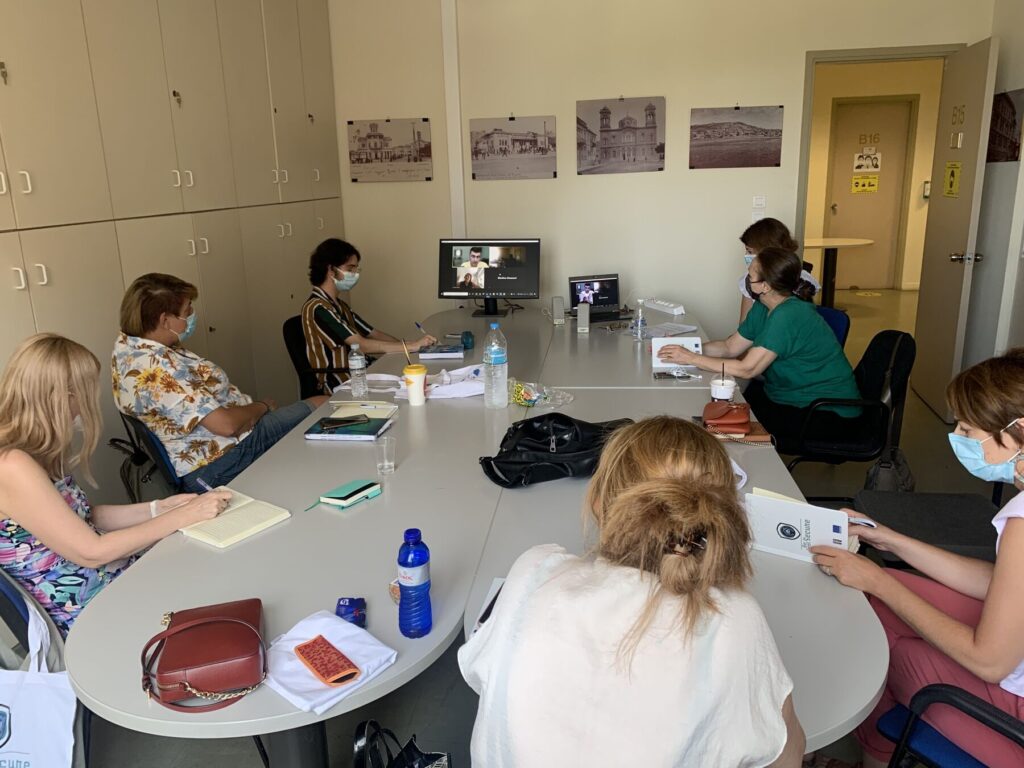
While active participation from organizations has prevailed over individuals’ participation, BSFS will seek to involve city dwellers in the beatification of schools. Following the recommendations of the UIA expert, the Municipality will try to make the selection of properties based on citizens’ suggestions. Local artists will be involved in the beautification of walls of certain schools. Artists will propose designs and the community (students, teachers, parents) will vote for the final result. As mentioned in this publication, participation of individuals is key for the longevity of projects.
Lastly, we observe the evolution of the Local Council of Crime Prevention (LCCP )and its level of participation. The creation of the LCCP is one of the core actions of the BSFS and it can potentially solve one of the most important problems identified, which was the lack of inter-department cooperation. However, since the summer of 2021, the LCCP was not very active. Even though, actors from different local departments are involved in the LCCP, local authorities support the LCCP, and are aware of BSFS project’s actions (such as sessions, webinars, etc.), the LCCP is independent from the BSFS project. This raises the question: what could be done to incentivize activities? One of the possibilities discussed is its involvement on the improvements that are going to be done in schools. And while at the moment BSFS estimates that engagement with the LCCP can only be related to the promotion of activities they are conducting, they foresee a more active engagement during 2022, when the CURIM platform will be ready to operate.
Challenge 5: Monitoring & evaluation
Indicators to capture achievements, enabling learning and improving, isolate and discount achieved results from external factors, measure the real added value.
As mentioned earlier, an important change has been the extension of the project by 7 months, to recover delays imposed by COVID-19. In addition, this extension will allow the project to properly evaluate the impact of all actions: the Victim Support Unit, the CURIM Platform, and the socio-spatial modifications.
Currently, the evaluation framework is being prepared for the METHE, the spatial transformations, the social actions, the technical tools, and the technological actions. The CURIM pilot evaluation is still pending but it will be finalized once the platform is released in working order (February 2022). Of course, each of the actions to be evaluated require different metrics. In the case of public events such as the Minecraft online competition or the Open Information Days (see Challenge 6 – Communication with beneficiaries), they are evaluated on the basis of number of attendants, feedback from attendants or online metrics (such as visits to the dedicated website of the event). The actions of beautification will be measured through surveys. And for the METHE, interviews and surveys with the users will be conducted. Panteion University is leading the activities of evaluation. Also, it is worth noting that it is the first unit of its type in Greece, meaning that there are no points of comparison.
Challenge 6: Communication with beneficiaries
Communication at local level about progresses, benefits, and problems.
n spite of the difficulties and the varying protocols put into place for the COVID-19 pandemic, the BSFS project carried out an important amount of activities to communicate the progress of the project, both locally and internationally. Evolving from the previous period, communication in the present period was marked by a more direct contact with citizens.
A BSFS promotional video was published, aiming to increase awareness and incentivize communication with project partners and target groups. The videos concisely describe the projects goals, the actions, and invites users to participate in the CURIM app (they are available in English and Greek). Brochures were distributed. These materials were important for the events that followed.
The “Open Information Days” have continued (as described in Journal no. 1), with increased visibility. The first took place in June 2021 to establish dialogue with citizens regarding urban security, in the presence of the Mayor, the Deputy Mayors, the LCCP, and the Municipal Police. Over 1500 attendants received brochures and afterwards the BSFS saw an increase in engagement on social media platforms, reflecting that this event was effective to attract the attention of the citizens. As previously mentioned (see Challenge 4 – Participative approach), the contact with citizens is vital to better understand their needs and improve trust on the project. The second event was the “BSFS Open Information Days” – a side event in the framework of the EFUS International Conference, which took place in Nice in October 2021 (see Challenge 7 – Upscaling).
An important part of the agenda of the METHE staff, Panteion University, and the Municipality has been the discussion with social and institutional stakeholders of the city to introduce them to the unit and discuss the cooperation framework and referral system. Some of the organizations contacted are the Department of Education, the Departments of Social Services, the Directorate of Kindergardens, the Municipal Police, Minor Protection company of Piraeus, and UNESCO. The project has over 20 stakeholders, and 6 permanent collaborators in terms of receptions and referrals of cases. On September 2021, an event was organized by the Municipality and Panteion University in the City Hall to officially inform the stakeholders (that were identified by the Municipality and Panteion University prior to the establishment of the METHE) of the beginning of operations. The meeting was both online and in person. The unit has been recently promoted by the Municipality’s services, and leaflets have been placed and distributed in key points to reach out to citizens. Thus the METHE is activating a network of organizations with various specializations, which ultimately can be put into action to better support victims of crime.
Challenge 7: Upscaling
Next steps, conditions and resources needed in next iteration, role of partners in upscaling process, potential new challenges in upscaling, when should it start.
As mentioned in the previous journal, the EFUS is an important collaborator when it comes to upscaling. During this period, the BSFS project was present in various activities within the framework of the EFUS international conference in Nice in October 2021. During this event, project representatives shared the project’s results and methodology (especially concerning the CURIM app and the analysis of the surveys that were carried out the past period). BSFS likewise was able to host a stand which increased the visibility of the project and communication with other city representatives facing issues of security. During this moment, project representatives presented the project to visitors and other fellow security experts from various European cities. The BSFS project shared its results with 2 other UIA urban security projects: ToNite and SURE, during a plenary session in May 2021 and in the aforementioned conference in Nice. The interaction with projects tackling urban security in other European cities is beneficial for the project. It can provide with a wider perspective of various problems that may be similar but have been treated differently, and they can also open doors for dissemination and transfer of results and methods. Project representatives have been very active in local and international forums of various aspects of security, such as criminology, technological innovation, and cybersecurity. This presence and recognition add to the legitimacy of the project. EFUS has also set up a procedure with practice sheets that have been presented to BSFS in which they integrate the lessons learned and good practices. They are also working in the update of the urban agenda to see how the BSFS experiment enters within these European Actions.
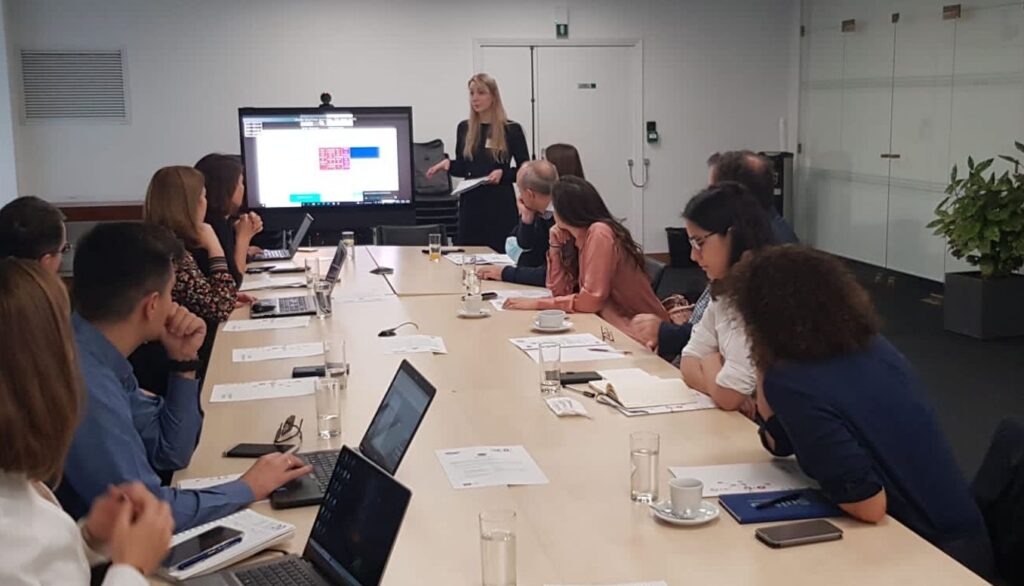
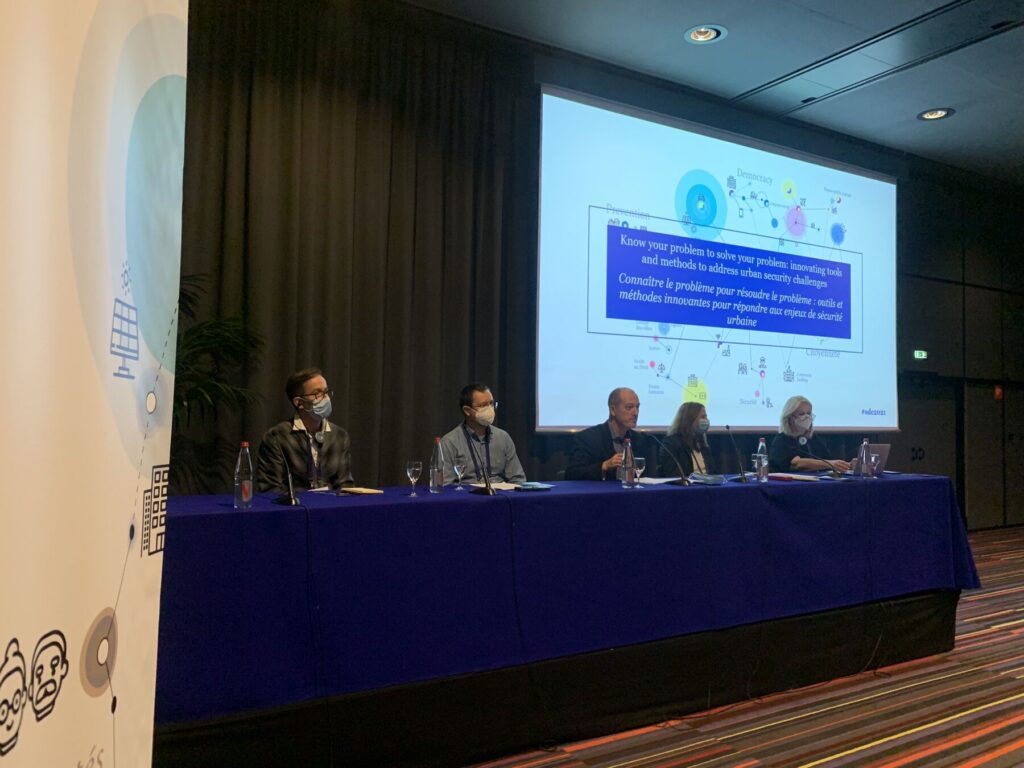
While the holistic approach to security is indeed commendable (meaning that it aims to treat security as a complete system), the BSFS has faced several challenges throughout implementation that are worthy of attention. The fact that the project has a highly ambitious agenda of security-related problems (ranging from theft to cyberbullying) has had positive and negative impacts. On the one hand, it has called for a diverse set of skills and sensibilities from participants. On the other hand, each of these problems -due to their nature- are treated separately (for example, there is hardly any overlap between domestic and cyberthreats). This in turn creates a heavy set of actions to be carried out that only advance the project to cover one of these problems at a time.
The improvement of public property as a means to deter crime and improve perception could have been a project itself. The project leans heavily on technological developments, and the socio-spatial actions appear as secondary. The BSFS team notes that citizen participation could be improved in a future iteration of the project. They also mention that having the UIA expert on board for the planning stage (this is, prior to implementation) would have been helpful to prevent oversights. Beyond the unforeseen complexities that spatial solutions for security entail, throughout this period, the BSFS team has faced the issue of the limited resources at their disposal vs. the need of improving security in schools (which appears to be in high demand). Additionally, the issues regarding ownership of buildings, as well as the chain of command and responsibilities within the Municipality have entailed considerable delays.
However, when it comes to delays, the COVID-19 pandemic was a highly unpredictable event that affected the delivery of various stages. This has resulted in a necessary extension of 7 months.
Another challenge of note for the BSFS is the standardization of processes for a new iteration. Discussions on standardization have focused on how to work with the LCCP, the CURIM platform, and how this information can be treated to evaluate urban security results. The project has piqued the interest of representatives of other municipalities, particularly with regards to CURIM. The BSFS project could be the point of reference for municipalities who would like to apply the BSFS model, providing examples and recommendations.
Conclusion
This has been a lively and challenging period for the implementation of the BSFS project in Piraeus. The impact of the COVID-19 pandemic came mostly in the form of cumulative delays, and while the project is mitigating the delays, it will require an extension to properly assess the effects the actions will have on the local context. However, in spite of the adverse conditions, the BSFS project continues its operations to improve security from various fronts.
A notable success of the project was the establishment of the LCCP to create a space where diverse stakeholders in local security could interact and communicate with each other, but that requires attention. As for one of the main milestones -the establishment of the Victim Support Unit-, this is a unique initiative in Greece that provides with a necessary service: a space where victims of crimes can find support for almost any type of incident. It is on its early stages of operation and we will see in the upcoming months how it is received and what new challenges and opportunities arise. The CURIM app is expected to be in operation by February 2022, and has been presented to various audiences to incentivize its use. As for the spatial transformations, the BSFS team had to adapt to unforeseen conditions while preserving the goal of transforming buildings as a means to improve the perception of security. The months to follow will provide with more information on how this project interacts with local and international stakeholders and city dwellers to improve security, and the lessons to be learned as this project enters the last stages of implementation and evaluation.



